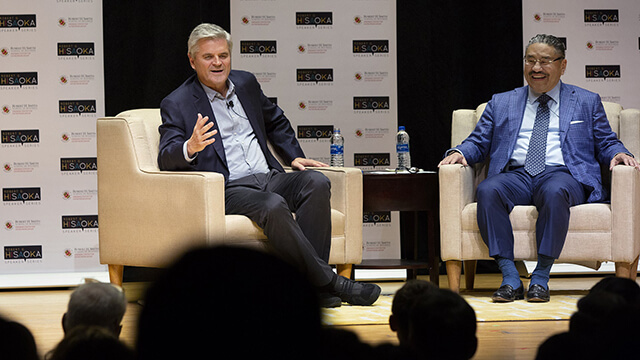- October 10, 2018
- By Maryland Today Staff
As a co-founder and former CEO of AOL, Steve Case had a hand in millions of Americans’ first internet forays in the 1990s with the company’s ubiquitous dial-up service.
As the first guest in this year’s Robert G. Hisaoka Speaker Series, Case last night drew on his long career as an internet pioneer, venture capitalist, philanthropist and nonprofit leader—not to mention pizza development executive—to share tips and stories about entrepreneurship.
Case spoke before a packed Gildenhorn Recital Hall at the Clarice Smith Performing Arts Center in a conversation with Hisaoka ’79—a major auto dealer, investor and philanthropist. His three-year gift created the speaker series, which brings business leaders and startup founders to campus to provide real-world context on business and venture creation.
Here are five takeaways for would-be entrepreneurs:
Be nice
Network building is key to business success, Case said, but being a pleasant person doesn’t hurt, either. He was a high school senior in Hawaii when future President Barack Obama enrolled at the school as a freshman. It’s lucky that Case didn’t give the underclassman a noogie, swirlie, wedgie or other unpleasantry. “He went on to control the FBI, the IRS…” Case joked. Obama later tapped Case to advise on White House policy on jobs and entrepreneurship.
Foresee change, and the role you can play
Great entrepreneurs see where things are headed and determine how to make the changes work for a startup business. In college in the late 1970s, he became fascinated watching the growth of the internet, which at the time was limited mainly to academic and government researchers. A 1980 book by futurist Alvin Toffler that compared the coming digital revolution to the agricultural revolution sealed it for him. “I remember reading that and saying, ‘I know he’s right, and I want to be a part of that.’”
Practice perseverance
AOL was founded in 1985, but several years in, it still had fewer than 200,000 subscribers. Seven years later, Case said, it was tens of millions, and the growth of the company skyrocketed. In between were years of struggle, and occasional worried calls from his parents, he admitted. “It seems obvious now, and of course all of you without your smartphones, your laptops, your iPads or what have you couldn’t live without the internet. But for a decade, nobody really believed in the idea, and nobody really about what we were doing.”
Go beyond ideas to execution
The much-heralded—and then much-reviled—2000 merger of AOL with Time-Warner made perfect sense on paper. The reality was that combining a brash recent Internet startup with a staid media company created a massive culture clash that led to failure. “The lesson to me was not so much about the idea, the strategy, the vision… the vision was there, the execution was not there,” Case said. “And what could have become the first trillion-dollar company and the first company to offer all the digital services we all take for granted stumbled because of people.”
Understand the limits—even with the best job title ever
Before AOL, while trying to figure out how to get into an internet-related industry, Case ended up as Pizza Hut’s “director of new pizza development.” Even if it wasn’t his dream job, it was still a dreamy job—traveling the country eating pizza and looking for new ideas. The only problem: When he found a good product, it was still up to the company’s teenage pizza chefs to produce the pies, leading him to reflect, “A lot of things that seemed like good ideas turned out to be not so easy to put through the system.”
Topics
Campus & Community